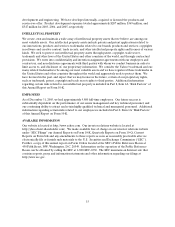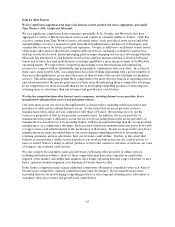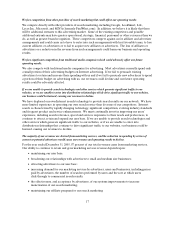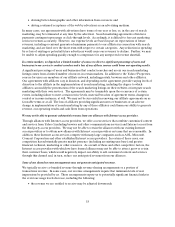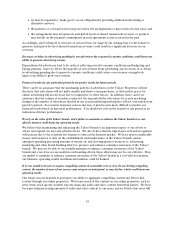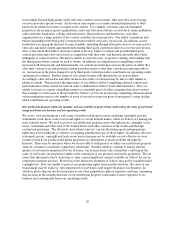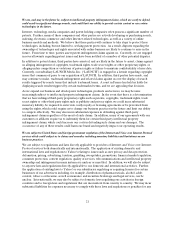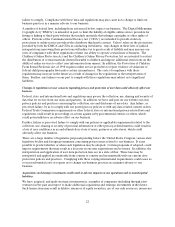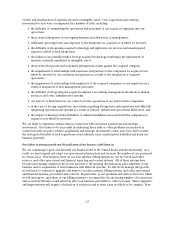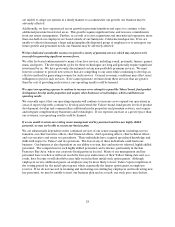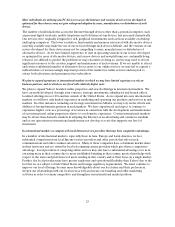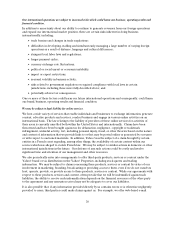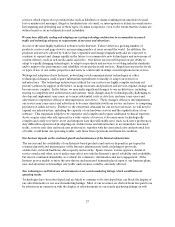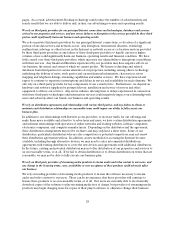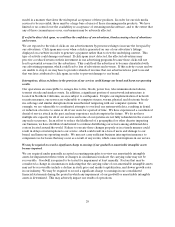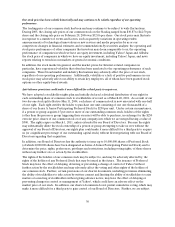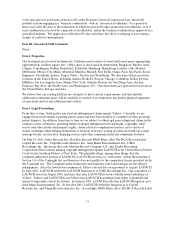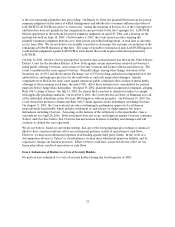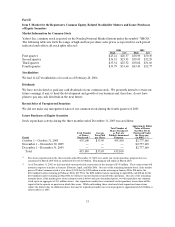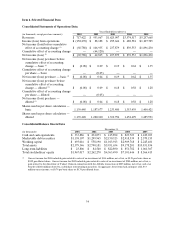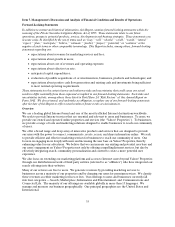Yahoo 2005 Annual Report Download - page 31
Download and view the complete annual report
Please find page 31 of the 2005 Yahoo annual report below. You can navigate through the pages in the report by either clicking on the pages listed below, or by using the keyword search tool below to find specific information within the annual report.25
More individuals are utilizing non-PC devices to access the Internet, and versions of our service developed or
optimized for these devices may not gain widespread adoption by users, manufacturers or distributors of such
devices.
The number of individuals who access the Internet through devices other than a personal computer, such
as personal digital assistants, mobile telephones and television set-top devices, has increased dramatically.
Our services were originally designed for rich, graphical environments such as those available on desktop
and laptop computers. The lower resolution, functionality and memory associated with alternative devices
currently available may make the use of our services through such devices difficult, and the versions of our
service developed for these devices may not be compelling to users, manufacturers or distributors of
alternative devices. As we have limited experience to date in operating versions of our service developed
or optimized for users of alternative devices, and as new devices and new platforms are continually being
released, it is difficult to predict the problems we may encounter in doing so, and we may need to devote
significant resources to the creation, support and maintenance of such versions. If we are unable to attract
and retain a substantial number of alternative device users to our online services, we may fail to capture a
sufficient share of an increasingly important portion of the market for online services and may fail to
attract both advertisers and premium service subscribers.
We plan to expand operations in international markets in which we may have limited experience or rely on
business partners, and in which we are faced with relatively higher costs.
We plan to expand Yahoo! branded online properties and search offerings in international markets. We
have currently developed, through joint ventures, strategic investments, subsidiaries and branch offices,
localized offerings in over 20 countries outside of the United States. As we expand into new international
markets, we will have only limited experience in marketing and operating our products and services in such
markets. In other instances, including our strategic investment in Alibaba, we may rely on the efforts and
abilities of foreign business partners in such markets. We have experienced and expect to continue to
experience higher costs as a percentage of revenues in connection with the development and maintenance
of our international online properties relative to our domestic experience. Certain international markets
may be slower than domestic markets in adopting the Internet as an advertising and commerce medium
and so our operations in international markets may not develop at a rate that supports our level of
investment.
In international markets we compete with local Internet service providers that may have competitive advantages.
In a number of international markets, especially those in Asia, Europe and Latin America, we face
substantial competition from local Internet service providers and other portals that offer search,
communications and other commercial services. Many of these companies have a dominant market share
in their territories and are owned by local telecommunications providers which give them a competitive
advantage. Local providers of competing online services may also have a substantial advantage over us in
attracting users in their country due to more established branding in that country, greater knowledge with
respect to the tastes and preferences of users residing in that country and/or their focus on a single market.
Further, the local providers may have greater regulatory and operational flexibility than Yahoo! due to the
fact that we are subject to both United States and foreign regulatory requirements. We must continue to
improve our local offerings, become more knowledgeable about our local users and their preferences,
deepen our relationships with our local users as well as increase our branding and other marketing
activities in order to remain competitive and strengthen our international market position.


